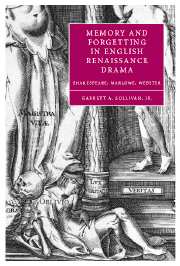Book contents
- Frontmatter
- Contents
- Acknowledgments
- Introduction: planting oblivion
- 1 Embodying oblivion
- 2 “Be this sweet Helen's knell, and now forget her”: forgetting and desire in All's Well That Ends Well
- 3 “If he can remember”: spiritual self-forgetting and Dr. Faustus
- 4 “My oblivion is a very Antony”
- 5 Sleep, conscience and fame in The Duchess of Malfi
- 6 Coda: “Wrought with things forgotten”
- Notes
- Index
- Cambridge Studies in Renaissance Literature and Culture
4 - “My oblivion is a very Antony”
Published online by Cambridge University Press: 09 October 2009
- Frontmatter
- Contents
- Acknowledgments
- Introduction: planting oblivion
- 1 Embodying oblivion
- 2 “Be this sweet Helen's knell, and now forget her”: forgetting and desire in All's Well That Ends Well
- 3 “If he can remember”: spiritual self-forgetting and Dr. Faustus
- 4 “My oblivion is a very Antony”
- 5 Sleep, conscience and fame in The Duchess of Malfi
- 6 Coda: “Wrought with things forgotten”
- Notes
- Index
- Cambridge Studies in Renaissance Literature and Culture
Summary
[M]emory has the orderliness and the teleological drive of narrative. Its relation to the past is not that of truth but of desire.
Critics of Shakespeare's Antony and Cleopatra have routinely focused on Antony's loss of his Roman identity. In doing so, they have assumed that Antony once had a unified identity to lose – assumed that he is “unidentical to himself and what he has been in the past.” This is true even of psychoanalytic criticism, which presupposes a subject who is not “stable and completely integrated” but is made up of “shifting and contradictory impulses.” Put simply, critics have attended closely to the non-self-identicality of Antony in the present of the play but have for the most part simply accepted his putative self-sameness in the past. In addition, given that Antony's Romanness is inseparable from his lost self-identicality, the category of Romanness itself is read as stable rather than fluid, contested and appropriable. Such views ignore Antony and Cleopatra's sustained interest in the constructedness of the past, an interest extended through the play's examination of the interrelations of memory, forgetting and desire.
Partly through analysis of the Circe episode in The Odyssey, this chapter argues for the supposed decay of Antony's identity as an example of erotic self-forgetting understood also as the forgetting of his country.
- Type
- Chapter
- Information
- Memory and Forgetting in English Renaissance DramaShakespeare, Marlowe, Webster, pp. 88 - 108Publisher: Cambridge University PressPrint publication year: 2005



